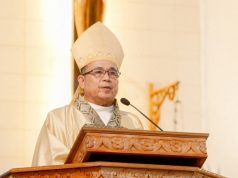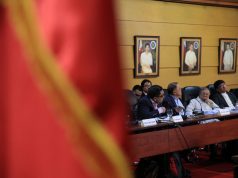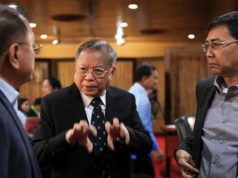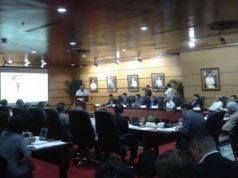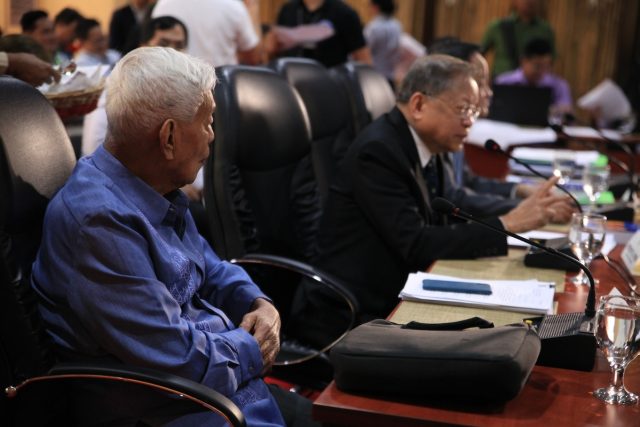
MANILA – Former Chief Justice Reynato Puno, the chairman of the Consultative Committee tasked to review the 1987 Constitution, on Monday stressed the need for an anti-political dynasty provision in a revised Constitution which will pave the way for a federal form of government.
On Monday, after the Concom voted to have a regulated ban on political dynasties up to the second degree of consanguinity and affinity, Puno was interviewed by reporters who asked him about the value of breaking down such political dynasties.
“Napaka-importante nito dahil kapag nag-federalize tayo ay marami tayong mga kapangyarihan na ibibigay sa mga constituent units… doon sa mga states or regions, kung tatawagin natin itong regions. Hindi natin pwedeng ibigay ang kapangyarihan doon kung itong mga units na ito ay pinamumugaran ng mga political dynasties (This is very important because if we federalize, we will give so much power to the constituent units… to the states or regions, if we will indeed call them regions. We cannot give power to them if these units are infested by political dynasties),” he replied.
He added that an anti-political dynasty provision in the revised Constitution must be self-executing.
“Pagka hindi natin ginawang self-executing ‘yan, it will be a perpetual problem. Nakita na natin ‘yan, magte-thirty-two years na itong problema na ito at hindi nila mabigyan ng solusyon sa Kongreso. So dito na ang pagkakataon nating bigyan ng final solution ito (If we do not make that self-executing, it will be a perpetual problem. As we have seen, this problem has been here for almost 32 years and the Congress hasn’t come up with a solution for it. So now is the chance for us to give this a final solution),” Puno said.
Should an anti-political dynasty provision be included in a revised Constitution, current political dynasties will be dissolved, as, he said, “They can no longer run within the second degree of consanguinity or affinity.”
According to the Concom’s definition, an incumbent politician’s relatives up to the second degree include: children and their spouses (including legitimate, illegitimate, legitimated, adopted, and stepchildren); spouse; parents; spouse’s parents; grandparents; spouse’s grandparents; siblings and spouses; spouse’s siblings; and grandchildren.
Asked to gauge Congress’ response, Puno replied, “Hindi natin masasabi kung ano ang action nila eh (We cannot say what their action will be). But we are hoping that all will pursue this problem in accordance with the best interests of the people.”
He added, “We will do what we think is right. Bahala na ang taumbayan (It’s up to the people).”
Concom member and De La Salle University political science professor Julio Teehankee called the vote “a victory for the Filipino people.”
“Finally we have a working, a strong, and yet, a reasonable anti-dynasty provision,” he said.
The Concom will present their recommendations to President Rodrigo Duterte in time for his State of the Nation Address in July.
The Concom still needs to settle regulations on political dynasties when it comes to simultaneous candidacies and simultaneous holding of positions. For example, said Teehankee, what if there are no incumbent politicians, but several members of the same family run during the elections, with four or five ending up with the win?
Also on Monday, the Concom discussed including in the anti-dynasty regulations politicians’ partners outside of marriage, such as “mistresses, boyfriends, same-sex partners, domestic partners, and analogous (partners),” but were unable to resolve it.
At the heart of the issue, said Teehankee, was the battle against the “evil” that was the “incumbent advantage, which leads to self-perpetuation”.
He cited studies that show that local officials who have been elected several times have the tendency to use their position as an advantage in terms of electoral competition.
A study by the Ateneo School of Government (ASOG), in particular, warns that if the issue of political dynasties is not addressed, 70 percent of local government officials will be dynastic by 2040.
Particularly alarming is the preponderance of what ASOG calls “fat dynasties,” said Teehankee. As opposed to thin dynasties, where an elected official passes on his or her seat to a relative, under fat dynasties, an incumbent has several relatives running for various positions in the national and local levels.
“There’s nothing wrong with a family of professionals. It’s part of human nature that parents would like their children to continue in their profession. But of course, there might be a family of lawyers, a family of doctors, a family of engineers. But when we speak of public office, a public office is a public trust, and it is incumbent that in a functioning, healthy democracy, there must be a good circulation of new players replacing the old,” Teehankee argued.
He likened the preponderance of political dynasties to an unhealthy body whose arteries have been clogged by cholesterol, just like “corridors of power” have been clogged by political clans.
At least 295 political families exist currently, with the largest concentration in Metro Manila (31), followed by Central Luzon (21), CALABARZON (20), Bicol (15), Western Visayas (12), MIMAROPA (11), and Central Visayas (ten), reported Teehankee.
In terms of provinces, he said that the largest concentration of political families are in Maguindanao, Sulu, Batangas, Pampanga, Bulacan, Rizal, Pangasinan, Ilocos Norte, Nueva Ecija, Batanes, Lanao del Sur, Masbate, Cavite, La Union, and Isabela.
There’s more: 81 percent of Filipino governors come from political dynasties; 78 percent of congressmen are from dynastic families, as do 69 percent of mayors and 57 percent of vice mayors.
Studies also show that in the poorest provinces, there are many fat dynasties, Teehankee said.




